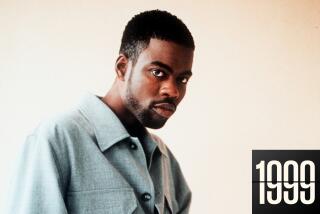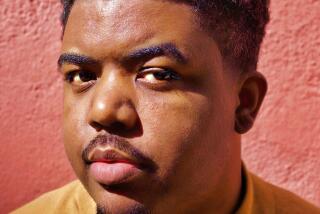The Beat Is Off Beat on Stereotypes
- Share via
The Beat (KKBT-FM) has again managed to enrage a substantial portion of the community by attempting to find humor in a racial stereotype--and it has again been forced to back down. This time, the Beat was accused of mugging African-Americans with a parody called “Little Crackhead,” which it has now dropped following protests led by the Brotherhood Crusade (Morning Report, Oct. 16).
Last year, Media Action Network for Asian-Americans demanded that the Beat stop mocking Asian-Americans during its newscast. The Beat management trotted out the by-now-tired excuse that it was all done in good fun. When pressed a little harder the Beat management ticked off all the supposed great things it has done for minority communities. When that didn’t work, it fell back on the line that many blacks/Asians/Latinos yuk it up at this nonsense too. But then, too, KKBT relented under pressure.
All this may baffle some listeners of the popular station who obviously choked with laughter at the Beat’s displays of insensitivity. They may wonder what’s the big deal about skits like “Little Crackhead?”
The big deal, of course, is that stuff like this not so subtly reinforces the public belief that blacks are to blame for America’s drug problem and further deepens the public suspicion that blacks are a menace to society.
The “Little Crackhead” skit is more than just irresponsible mockery of a life and death issue. The Beat’s mostly under-age-21 audience is impressionable and thus ripe to be influenced by the worst stereotypes about blacks, the most popular and wrongheaded being that the drug problem is exclusively a black problem. It isn’t. Former Reagan drug czar William L. Bennett, who could never be mistaken for a liberal, in a candid remark long since put that notion to rest: “The typical cocaine user is white, male, a high school graduate, employed full time, and living in a small metropolitan neighborhood.”
But those at the Beat can perhaps be excused if they think Bennett is a liar. After all, like much of America, they are fed a nightly diet of “Action News”-style shots of young blacks males prone on the ground, handcuffed against walls and spread-eagled over the hoods of police cars. They are stuffed with the daily newspapers umpteenth recycling of crime-drug-gang violence-in-the-ghetto stories.
They can perhaps also be pardoned for their warped humor since they don’t regularly see stories on the many Hollywood actors, writers, and producers, Wall Street stockbrokers, corporate officials, middle- and upper-managers, and office personnel who are also junkies and dealers who contribute to the staggering escalation in heroin, cocaine, LSD, methamphetamine, and scores of other dangerous drugs.
I’m certain they don’t know about the most recent study on drug abuse by the University of Michigan that revealed that black high school seniors were the least likely group of students to use cocaine. This explodes the myth believed by nearly everyone in America, and that includes many African Americans, that blacks and drugs are interchangeable words.
I’m equally sure that those at the Beat ignored or paid scant attention to the spate of recent articles in Newsweek, USA Today, People magazine and other major publications that froth about the “new” drug plague, their pages crammed with pictures of young whites snorting, mainlining, and popping drugs. Yet there is almost no mention of arrests, prosecutions, and tough prison sentences for white middle-class addicts. Instead there’s much talk of compassion, hand-wringing sympathy, prayer sessions and expensive psychiatric counseling, treatment and rehab programs, private treatment centers, and drug diversion programs.
How ironic that this picture emerges at a time that much of the public and many policy makers refuse to support more funding for programs that would help uplift the nation, including the poorest African American communities: education, health, job and skills training, non-punitive welfare reform, drug prevention and rehabilitation. Instead, too many are more than willing to invest in armies of police, prosecutors and bigger prisons while deluding themselves that they have done something to solve the drug scourge.
A final bitter irony is that many African Americans are enraged over the recent allegations that CIA-backed Contra operatives sold massive amounts of crack cocaine in black neighborhoods to finance the Contra war against the Sandinista regime. Even if the allegations aren’t true the fact is that the crack epidemic has slammed America hard, and African Americans even harder.
This is no laughing matter for the thousands whose lives are destroyed and their families shattered by crack. And there is hardly any humor in the societal damage done by the crack scourge or by any illicit drug that eats away at the fiber of our nation.


